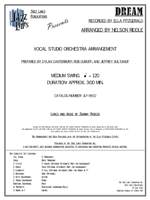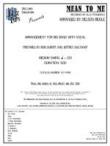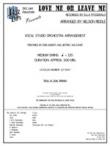DREAM [DOWNLOAD]
Recorded by Ella Fitzgerald
Arranged by Nelson Riddle, Prepared by Dylan Canterbury, Rob DuBoff, and Jeffrey Sultanof

Cat #: JLP-9652DL
$65.00This product is available for immediate download after purchase.
Questions?
Please call +1-518-587-1102 or email us.
Edition: Jazz Studio Orchestra Arrangement with Vocal
Description: Swing - Medium Difficult
Publisher: Jazz Lines Publications
This Nelson Riddle arrangement from the 1964 album Ella Fitzgerald Sings the Johnny Mercer Songbook could be used in arranging textbooks as a perfect example of simple-yet-effective. Although the proceedings are straightforward and without any unexpected twists, this chart serves as a lovely framework for Fitzgerald's incomparable vocal skills.
After the verse is performed as a duet between vocals and harp (the harp is cued in the piano part), the medium swing tempo begins at measure 9. The soft underpinning held tones in the woodwinds and horns function almost more like something Riddle would have written for strings, but offer a deeper, more resonant sonority. More rhythmic backgrounds are provided by the saxophones and trombones; these hits are stock Riddle, but with material as good as his, why not recycle it?
The full ensemble enters for the shout section at measure 39. Riddle leaves enough space around the melody to allow for some brief solo vibraphone interjections from Frank Flynn. Another solo cameo comes in at measure 49, this time from clarinetist Buddy DeFranco (this solo may also be played by trumpet 4), before the vocals return with some recycled backgrounds at measure 57. The band's volume level gradually begins to trail off beginning at measure 65. A brief solo from the bass trombone sets up a final harp flourish to set up the brief last chord from the woodwinds and rhythm section.
This arrangement is for female vocal soloist and studio orchestra. In lieu of the typical string ensemble, this time the big band is augmented by 2 flutes, 2 oboes, 2 clarinets, 2 bassoons, and 3 horns in F instead of the typical strings. The story goes that Norman Granz was concerned about the budget and refused to hire string players. Thus, Riddle saved some money and hired some additional woodwind players and probably relied on overdubs to complete the mix. This publication is presented as-written by Riddle but also included are optional string parts that may be used in place of - or in addition to - the woodwind and French horn parts. An optional synthesizer part is also included that may be used in place of the string parts so this arrangement may be played by a standard big band with a synthesizer player. The vocal key is F.
This publication has been prepared from the original set of parts used during the recording session - this is not a transcription.
Vocal
2 Flutes
2 Oboes
2 Clarinets
2 Bassoons
2 Alto Saxophones
2 Tenor Saxophones
Baritone Saxophone
4 Trumpets
3 Horns in F
3 Trombones
Bass Trombone
3 Violins (Optional Alternate Part for Woodwinds)
Viola (Optional Alternate Part for Woodwinds)
3 Celli (Optional Alternate Part for Horns in F)
Harp (Optional)
Guitar
Piano
Bass
Percussion: Vibraphone/Bells
Drums
Trumpet 1: A5
Trombone 1: G4










